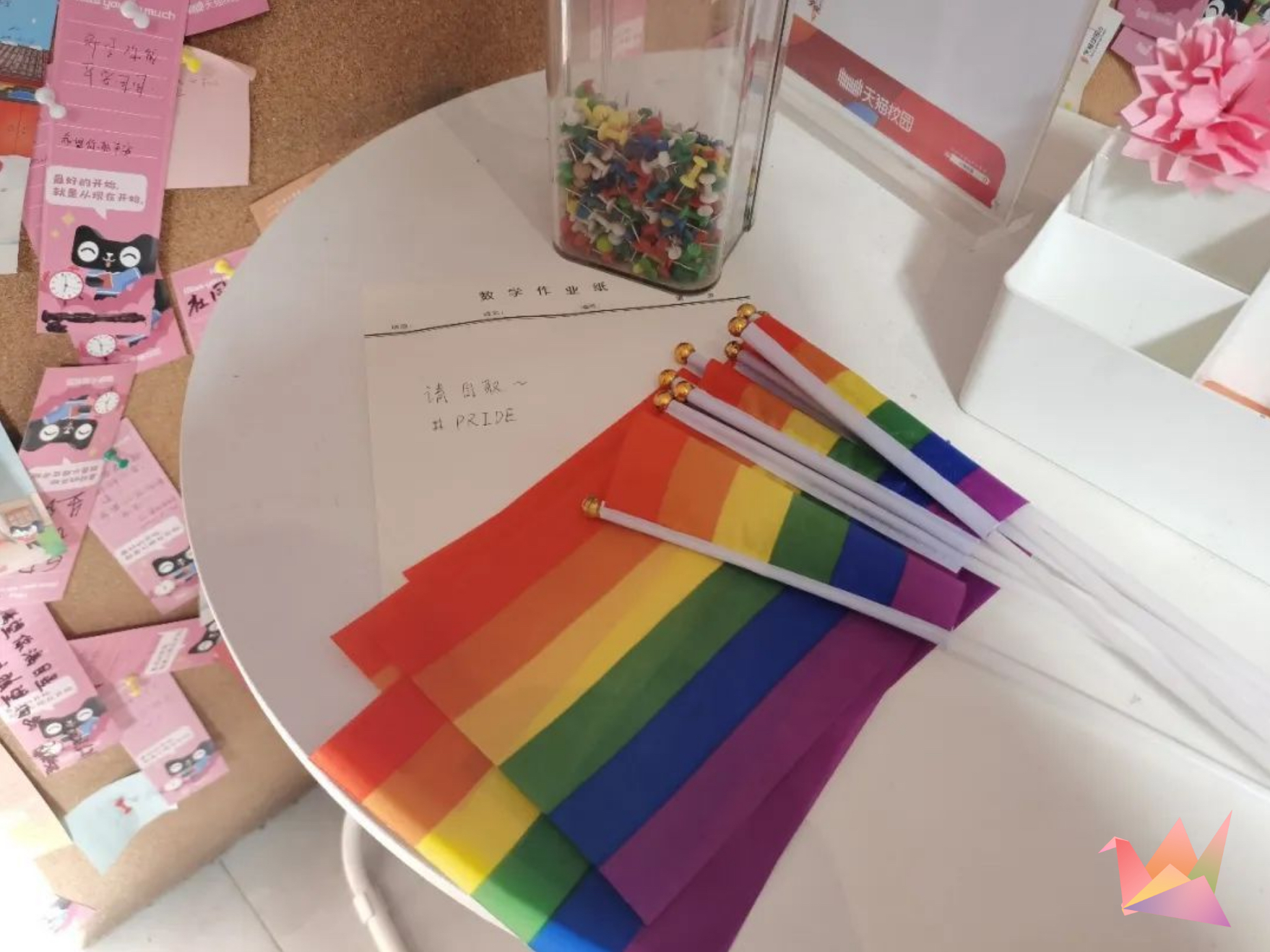The rise and fall of LGBTQ student groups in China
Two students at Tsinghua University were recently issued disciplinary warnings after distributing rainbow flags on campus. It's part of a trend: the space for LGBTQ activism in China is rapidly shrinking.

In the latest example of the diminishing space for LGBTQ activism on Chinese college campuses, two students from Beijing’s Tsinghua University, one of China’s most prestigious universities, have been disciplined for handing out a small number of rainbow flags at an on-campus location, an act condemned by the school as a violation of its student code of conduct.
According to a WeChat post that went viral last week before being deleted, the two students, referred to as student Huang and student Li, left 10 rainbow flags, a popular symbol of the LGBTQ rights movement, at an on-campus convenience store on May 14, along with a brief note encouraging people to take the flags and celebrate “#PRIDE.” On the same day, the pair was ordered to have talks with school officials.
Later in June, both of the students received letters of pending penalty issued by Tsinghua’s student affairs office, which accused them of “distributing promotional materials on campus without authorization,” a behavior that it said had violated campus regulations and could lead to disciplinary action.
Disagreeing with the accusation, the pair petitioned to have the penalty overturned. However, their appeals did not receive any response from school authorities. In mid-July, they were hit with two formal disciplinary warnings saying that they had caused “a negative impact” by distributing unauthorized rainbow flags on campus.
According to Bloomberg, the punishment will prohibit the pair from receiving scholarships or awards for six months. If they break another university rule during the period, they might receive a more serious penalty that “could appear on their personal file and rule them out for civil service and state-owned-enterprise jobs.”
“Moves against the rainbow flag are not unprecedented, but compared with what students in the past were able to get away with, this seems disproportionate,” Darius Longarino, a senior fellow at Yale Law School’s Paul Tsai China Center, told Bloomberg. “This incident is the latest example of university authorities increasingly constraining space for LGBT advocacy and expression — even when it is mild and low-key.”
The incident happened one year after WeChat, the all-purpose social media app in China, deleted dozens of LGBTQ accounts run by Chinese college students.
The history of LGBTQ groups at Chinese universities can be traced back to the early 2000s. Registered in 2006, the Rainbow Group at Sun Yat-Sen University (SYSU) in Guangzhou is often considered the first organization of its kind to gain official recognition, though the status was revoked in the following year. Most of the currently existing groups are much younger, coming into formation only in the past decade.
“When I attended university in Beijing, which was between 2007 and 2011, I couldn’t find any LGBT group in my school,” said Diǎn Diǎn 典典, a doctoral researcher currently based at Emory University. In 2008, she attempted to form a group for queer students in Beijing, but her recruitment post on the social media platform Baidu Tieba was quickly censored and her account was suspended. “There was already internet censorship of [LGBTQ topics] back then,” she said.
Despite the failed attempt, Dian managed to find communities outside her school. She joined a LGBTQ non-profit organization as a volunteer and became involved in queer activism. According to Dian, although LGBTQ student groups were scarce at the time, gender and sexuality issues were occasionally discussed by other student organizations such as sex education groups. It was in cooperation with these groups that local NGOs started to organized queer activities on college campuses.
Dian still remembers one of her first engagements with on-campus activism, where a different university invited her to share her life story as a lesbian. “After quite a few years, I was approached by a stranger when taking public transit in another city. She came to ask if I was the guest in the story-sharing event back in 2011. She told me that hearing my story was an impressive experience for her. I felt so moved at that moment,” Dian said.
As Dian remarked, these co-organized events played a significant role in introducing feminist concepts and LGBTQ knowledge to students, many of whom were struggling with their gender or sexual identity and could not find a community for support on campus. After the early 2010s, a cohort of groups dedicated to LGBTQ issues and led by queer students emerged.
According to a report released in 2020 that covers more than 50 LGBTQ student groups in Chinese universities, these coalitions exist both in universities located in major cities such as Beijing and Shanghai and in much smaller cities in middle and eastern China. Thirty-eight of them were established after 2014. Those in small cities were founded even more recently. Thirty-seven classify themselves as “education and advocacy” groups focusing on a variety of issues ranging from safe sex and HIV/AIDS prevention to gender equality and feminism.
Màomào 茂茂, a recent graduate from a university located in southern China, recalled his first participation in queer advocacy back in 2018 when he was a sophomore. In response to the call made by the LGBTQ group in his local university to celebrate May 17th, the International Day Against Homophobia, Transphobia, and Biphobia, he and a friend distributed pamphlets and rainbow flags at stores frequented by students. They introduced the cultural significance of May 17th to the business owners and asked if they were willing to display a rainbow flag outside the establishments to indicate that they were accepting and welcoming of LGBTQ individuals.
That fall, he joined a team of students on a short trip to Hong Kong to attend the pride parade. “As someone who had never been part of a march, it was an unforgettable experience for me to have the chance to openly express my sexuality and attitude,” he said. “I feel it is almost impossible to organize these activities nowadays. Things have changed so much in the past two years.”
The crackdown on LGBTQ advocacy work on Chinese college campuses has been going on for some time. In 2016, the Rainbow Group at SYSU was prohibited from hosting events on campus or collaborating with other student clubs. The following year, under pressure from school authorities, the group almost canceled their rainbow flag-raising activity on May 17th, an annual tradition that had lasted 12 years. The group’s WeChat account was suspended later in 2017. Around the same time, student leaders of LGTBQ groups from other universities also faced censorship on “sensitive” content posted on social media and restrictions on inviting experts from outside the school to speak on LGBTQ issues.
However, the recent wave of clampdowns seems to be more systematic and nationwide, and involves new actors beyond university authorities. “A new challenge for student groups is the rise of hyper-nationalist influencers on the internet and their use of the rhetoric of ‘foreign forces’ to witch-hunt activists,” Maomao said.
Dian suspects that the intensified crackdown on LGBTQ student groups in the past two years was prompted by the active role of students in several social movements in 2018, especially the MeToo movement, which first took off in Chinese universities, and campaigns advocating for labor rights.
“In China, any organized activity can easily become the target of surveillance,” Dian said. While certain student groups affected by the WeChat purge are allowed to exist, their use of social media is closely monitored by school authorities. Many of the groups can’t register new accounts under their names, which makes it difficult for them to reach out to non-members in universities, let alone the public. “The intention is to isolate the students,” she said.
Other LGBTQ stories:
For China’s same-sex couples, even guardianship is often out of reach (Sixth Tone)
In the absence of legal recognition of same-sex marriage, gay couples in China are seeking other legal avenues to gain guardianship rights.
A Chinese media releases a controversial coverage of transgender news, receiving criticism from the local LGBTQ community (镇镇的彩虹 zhèn zhèn de cǎihóng)
The Chinese media platform Guancha.cn picked up on a news report from the U.S. about a 17-year-old girl named Chloe Cole, who self-identifies as “former trans,” backing a ban on transgender medical intervention in Florida. The news was covered on the Chinese internet under the hashtag, “A 17-year-old girl in the U.S. regrets accepting sex change.” Queer and transgender activists in China have published articles to refute the transphobic comments.
Chinese queer community organizes film screening in Germany (Queer Squad)
Chinese queer documentaries and films are being screened in Germany as part of a celebration of pride month.
Queer China is our fortnightly round-up of news and stories related to China’s sexual and gender minority population.






